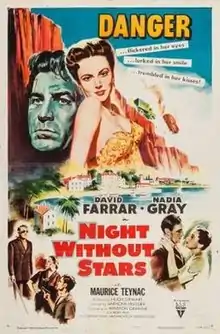Night Without Stars
Night Without Stars is a 1951 British black-and-white dramatic thriller film, starring David Farrar, Nadia Gray and Maurice Teynac. The screenplay was written by Winston Graham based upon his eponymous 1950 novel.[1] The film was directed by Anthony Pelissier and produced by Hugh Stewart.[2]
| Night Without Stars | |
|---|---|
 Theatrical release poster | |
| Directed by | Anthony Pelissier |
| Screenplay by | Winston Graham |
| Based on | Night Without Stars by Winston Graham |
| Produced by | Hugh Stewart |
| Starring | |
| Cinematography | Guy Green |
| Edited by | John Seabourne Sr. |
| Music by | William Alwyn |
Production company | Europa Productions |
| Distributed by |
|
Release date |
|
Running time |
|
| Country | United Kingdom |
| Language | English |
It was shot at Pinewood Studios with sets designed by the art director Alex Vetchinsky.
Plot
The film begins in the spring of 1947 on the south coast of France on the French Riviera.
English lawyer Giles Gordon (David Farrar) has been partially blinded during service in World War II, and fears his eyesight is worsening.
After he stumbles in a shoe shop, the shop assistant Alix Delaisse (Nadia Gray) recognises him later in the day and joins him at a cafe. She explains she is the widow of a French Resistance fighter hanged in Nice. Restaurateur Pierre Chava (Gérard Landry) approaches Giles and warns him off with the claim that Alix is already promised to him. He tells Giles that Alix is involved with black marketers, blackmailers and murderers from the war years and demands that Giles forget her and return to England.
Giles and Alix spend more and more time together. After a day of water sports in Monaco, he mistakenly enters a room of Alix's black market contacts. She tells him to go home to England.
Pierre also pressures him to leave. He goes to Pierre's flat and finds a dead body which, due to his poor eyesight, he presumes to be Pierre, but he is persuaded by a marketeer that it was not Pierre.
Giles goes back to England and goes to his doctor who says he can restore his sight. He has an operation and is shown a press cutting saying that Pierre has been killed in a car crash, but his body is unrecognisable.
Giles returns to France and wears dark glasses to disguise his restored sight. He tracks down Alix and reveals that he can now see. Armand invites him to dinner with Alix and explains the whole situation: Pierre had betrayed the Resistance group to the Nazis, bringing the death of Alix's husband, and they had sought revenge. Malinay (Alix's brother) had killed Pierre in his flat. He later returned to collect the body and stage an accidental death.
The marketeers decide Giles knows too much and try to stage another death, pushing him over a cliff in a car. They fail to see him fall out on the way down and presume he is killed when the car explodes at the bottom. Giles struggles to ascend the steep cliff back to the road. He returns to confront Malinay and declare his love for Alix.
Cast
- David Farrar as Giles Gordon
- Nadia Gray as Alix Delaisse née Malinay
- Maurice Teynac as Louis Malinay
- Gérard Landry as Pierre Chaval
- June Clyde as Claire
- Robert Ayres as Walter
- Clive Morton as Dr. Coulson
- Eugene Deckers as Armand
- Martin Benson as White Cap
- Gilles Quéant as Inspector Deffand
- Ina De La Haye as 'Mere Roget'
- Richard Molinas as Driver
- Jeanne Pali as Madame Colloni
- Marcel Poncin as Blind Man
Production
Producer Hugh Stewart called the film "quite stylish" but was unhappy with the casting:
Rhe central character was a man who was going blind, and resentful of this fact - prickly and awkward, but nevertheless one should see the charm. And I wanted David Niven to play this. And Richard Hamer who was in charge of the theatres at that time, 1946, said, "Niven? He's finished!"... And I had David Farrar. Well David Farrar was a very capable sort of actor, but totally wrong for this particular part, the film didn't do particularly well. [3]
Releases
The film was released theatrically in the United Kingdom on 4 April 1951, in Finland on 19 October 1951, in Sweden on 3 December 1951, in Portugal on 1 June 1952, in the United States on 5 July 1953 and in Denmark on 16 November 1953. It was released in Austria as Nacht ohne Sterne, in Denmark as Natten uden stjerner, in Finland as Tähdetön yö, in Greece as Nyhta horis asteria, in Italy as Notte senza stelle, in Portugal as Quando a Luz Voltou, in Sweden as Natt utan stjärnor, and in West Germany as Nacht ohne Sterne.
References
- Graham, Winston (1950). Night Without Stars (Book Club ed.). Doubleday & Co. ASIN B000NPI97I.
- "Night Without Stars (1951)". Brit Movies. Retrieved 16 August 2013.
- "Hugh Stewart". British Entertainment History Project. 22 November 1989.